Hola everyone, and welcome to yet another dev diary on the upcoming DLC for HoI4, where we’ll be talking about the second entirely new focus tree: Republican Spain.
Last week we talked a little bit about the design intent for Spain as a whole - so today we will move straight on to the interesting stuff
Obligatory Disclaimer:
This is still a work-in-progress, and much of the art, systems and balancing is/are not yet finished! You guys know the drill
Republican Spain Starting Situation

The starting position for Republican Spain is, naturally, the same as that for the Nationalists. They begin with the same 4 spirits, signifying the influence of Carlism, the Military’s disloyalty, and the political violence and strikes that are escalating in the initial half of 1936 (see our previous dev diary for more information on these).
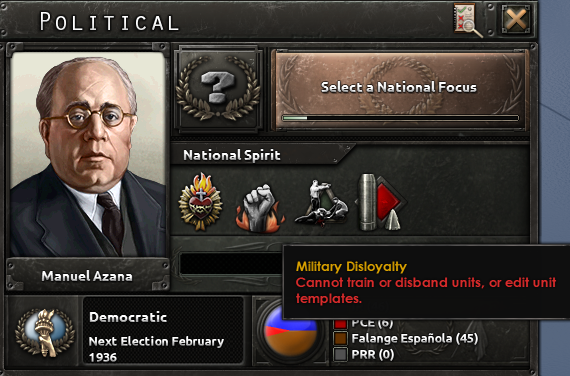
The same initial choice is present at the start of the game, but instead of selecting A Great Spain, we will now go with The Popular Front.
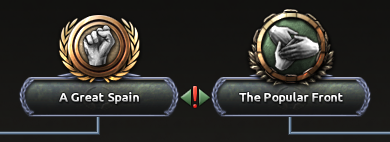
The Popular Front was a loose alliance of political parties that were only really united in their opposition of Fascism. The idea of a Popular Front was formulated by Stalin in the mid-1930s, suggesting that the rapid growth of Fascism required a more unified response than Communism alone could provide. Effectively, it gave permission to subordinate Communist parties to band together with less extreme socialist parties, and even outright bourgeois parties, solely to combat Fascism in national politics. In Spain, the Popular Front that opposed the Fascist/Traditionalist CEDA (Spanish Confederation of Autonomous Rights - sometimes called the “Nationalist Front”) consisted of a variety of liberal, socialist, and communist parties, the most important of which (for the purposes of this diary) are the Communist Party of Spain (PCE), Workers’ Party of Marxist Unification (POUM), and the Republican Left (IR). This coalition was also supported by regional nationalists and the Anarchist Trade Unions CNT/FAI. This coalition paid off, and despite massive resources and an overwhelming election campaign by the CEDA, the Popular Front won the 1936 Spanish elections.
This victory was to be short-lived, however. Unbeknownst to the Republicans, in the aftermath of the failed elections the CEDA would hand over their sizeable campaign chest to the plotting military leaders to finance a rebellion, and political violence from both sides would escalate in the coming months. As with the Nationalist side, this is represented by various decisions and missions. The sole distinction is the change in perspective. As all state garrisons are initially fully controlled by the Republican side anyway (they all begin with a Nationalist control of None), the garrison control decisions are unavailable until the Nationalist side has begun contesting Republican control in any location. From that point on, it becomes possible to attempt to flip them back.

A second point that sets the Republicans apart from their Nationalist adversaries are the nature of their focuses. The full pre-Civil War path for the Nationalists has a total duration of 210 days to complete, which means that, as long as a player continuously takes focuses, they are guaranteed to finish the whole path before the civil can start, even at the soonest start date. Not so for the Republicans. Republican pre-Civil War focuses (after the initial choice) last twice as long as their adversaries’, resulting in a total duration of 385 days to fully complete this path (therefore requiring the civil war to be delayed until after January 20, 1937). This should immediately make it obvious why it is advantageous for the Nationalists to begin the civil war as soon as possible - this will ensure the Republicans will only have time to complete their first two focuses. And as the impact of the Republican focuses progressively increases, this vastly weakens the initial position for the Republicans, relative to the Nationalists.
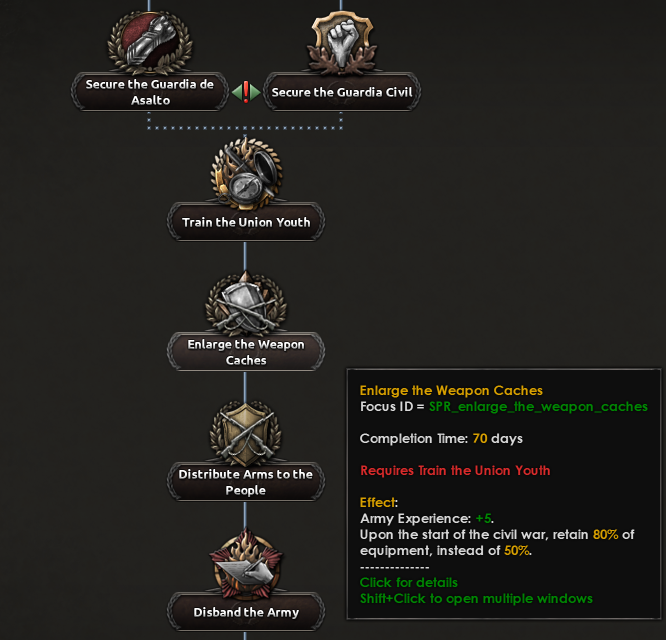

As the Civil War starts, the Republican side begins with all states that do not have Total Nationalist garrison control. However, states where the Nationalists have more control than the Republicans will spawn more Nationalist troops, making it likely that these will be lost soon afterwards. In addition, the Carlism Spirit is no longer relevant for the Republicans from this point on, and is removed, while a new Spirit Disbanded Army is added (again, regardless of whether Disband the Army as a focus is taken or not), representing the (quite frankly) disastrous impact the disbanding of the army historically had on the first months of the Republican war effort. Various focuses in the different branches diminish and remove this Spirit. Beyond this, the same Offensives decisions are available to the Republicans, as are available to the Nationalists (see more information about this again in our previous dev diary).
The Republican faction begins the civil war as Democratic, but as a whole it is even more internally divided than the Nationalists. Not three, but four different Republican factions vie for control of post-Civil War Spain, and this fight for supremacy will likely result into internal fracturing and outright violence even during the Civil War.
Republican (Democratic) Branch
The Second Republic at the start of the Civil War struggled to defend itself against the rebellion, while also maintaining cohesion and singularity of purpose within the faction itself. On the one hand, the communist and anarchist militias that supported the Popular Front played a key role in preventing the outright success of the initial coup attempt in the first place, and they were invaluable to the Republican war effort in the opening months of the Civil War, when the government was in the process of recreating a new army after disbanding the old. On the other hand, these groups also had wildly differing viewpoints on how the post-Civil War society should be structured, and idealism and fanaticism on all sides could easily bloom into violence. Historically, major influence came from the Soviet Union, which provided the Republic with much-needed weapons and equipment, but also meddled extensively in internal affairs, attempting to root out any Communists who might be critical of Stalin’s leadership. Ultimately, this would serve to completely undermine the war effort, resulting in the virtual elimination of two of the Front’s four (broadly-speaking) distinct groups as active participants in the Civil War, not by Nationalist doing, but by their own hands.
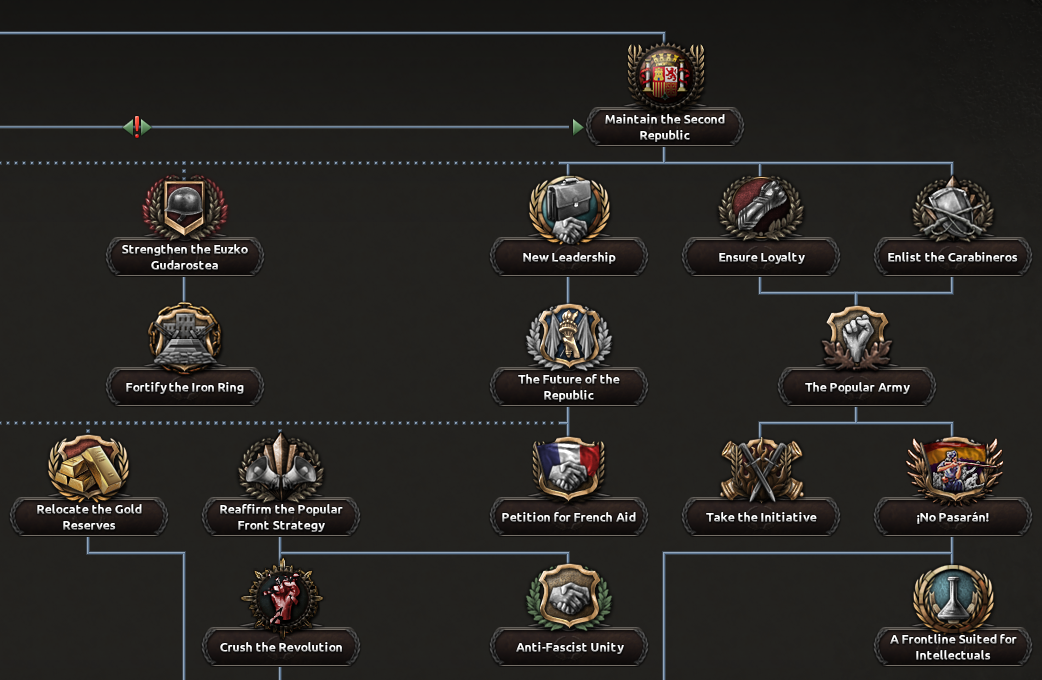
One of the major issues facing the Democratic government of the Second Republic involves the recreation of a proper army, reducing reliance on idealistic and undisciplined militias that is represented in the Disbanded Army Spirit. Others deal with stemming the flow of the Nationalist advance, fortifying the various cities and towns in their path, and especially fortifying the Republican foothold in the Basque Country (if this is controlled at the Civil War’s start). But above all, the single biggest threat facing the government in the short term is the inevitable uprising of the Anarchist and Independent Communist militias (always represented as Anarchists if this uprising occurs from the Democratic/Stalinist perspective), as Stalinist meddling and manipulations will eventually break down all remnants of trust within these groups and the government. This uprising may be delayed through the Anti-Fascist Unity focus and the decisions it unlocks, but these can only delay it somewhat, and never prevent it. They are only intended as a desperate measure if you really cannot afford the uprising right then. Just as with the Falangist and Carlists paths we discussed last week, a focus Crush the Revolution exists that will immediately trigger the civil-war-within-the-civil-war and provide a temporary combat bonus against them.
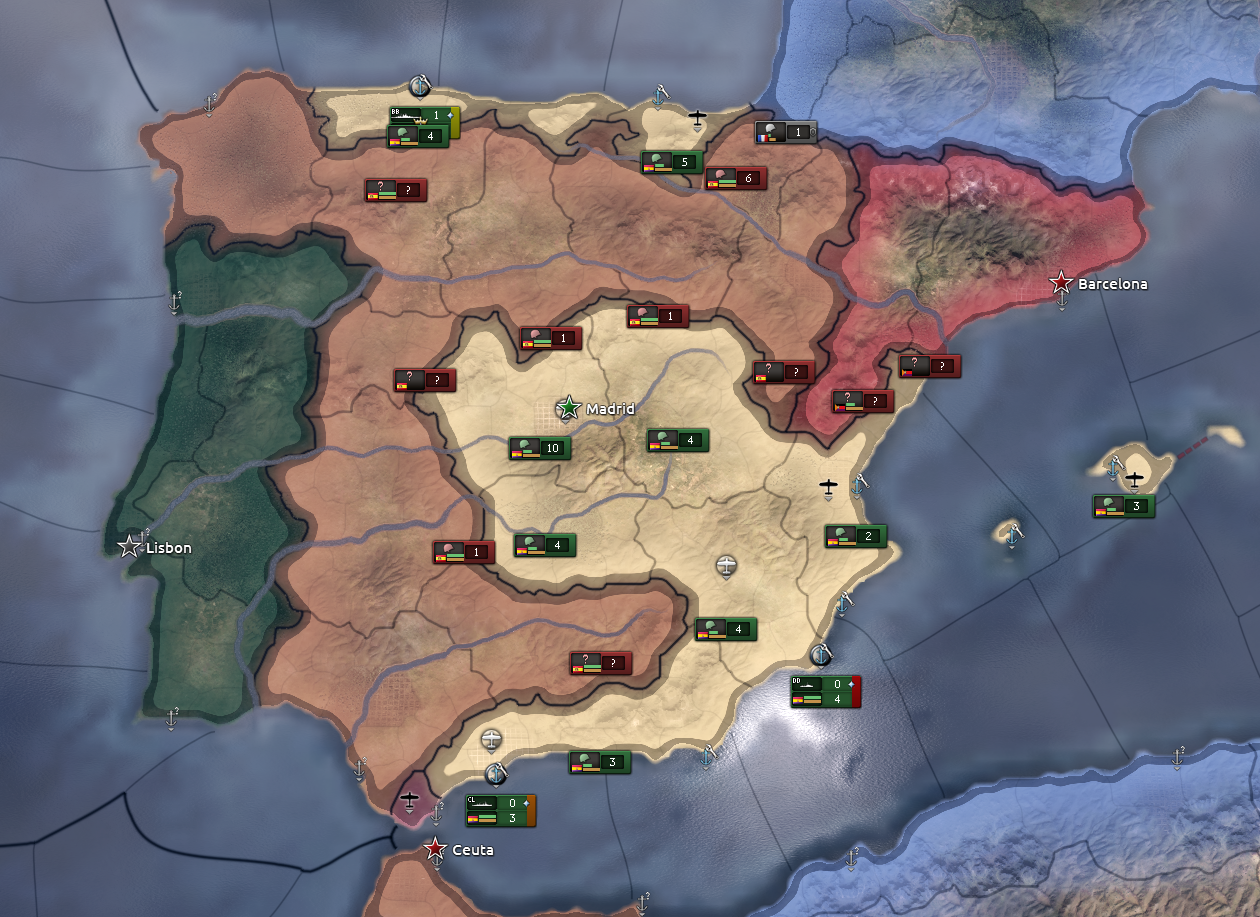
Together with Relocate the Gold Reserves, crushing the Anarchists and Independent Communists is a requirement for opening up the possibility of much larger Soviet aid than initially offered. This aid consists of various combat modifiers, tech bonuses, increased Volunteer caps for the Soviet Union, construction bonuses, and even tech sharing. It also opens up for a powerful Soviet Aid post-Civil War recovery branch. While powerful, as all this aid comes at a price, however… Stalinist control over the government will increase, and while moving the Gold Reserves abroad may keep them out of the hands of the Nationalists, it will not keep them safe from foreign seizure… Going down this path will result in the Second Republic being puppeted by the Soviet Union upon the conclusion of the civil war, and they will be unlikely to release their control over the country willingly…
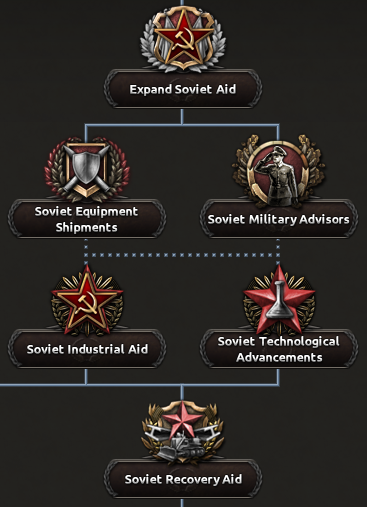
Regardless of whether the player decides to pursue this aid, they will need to manage the influence of the Stalinists on their own government. It is possible to maintain true to the Democratic principles on which the Second Republic was based, but this will come at the cost of combat penalties that may well prove to be problematic during the Civil War - the Communists were an integral part of the anti-Fascist fight, after all. However, staying true to your Democratic foundations will allow you to eventually subvert Soviet control even if you pursued Soviet aid previously and were puppeted as a result. This finally opens up into a branch where, now that the Fascists have been defeated, Spain may fight a final War of Independence against the Communists and the Soviet Union, to finally earn their deserved freedom. In this, they may either seek membership of the Allies, or strike a pragmatic Deal with the Devil and request military aid from those who have experience in fighting the Soviets - the very same people who opposed them during the Civil War: Germany and Italy.
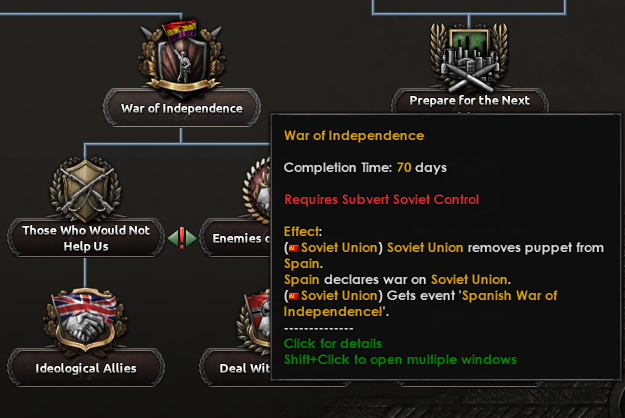
It is also possible to give in to the Stalinist pressure, and focus on defeating Fascism, even at the cost of Democratic principles. If this option is selected, the government will switch to Communist, and a future War of Independence becomes unavailable. Instead, it will become possible to Appeal for Increased Autonomy (on the Stalinist side), becoming a full-fledged member of the Comintern rather than a puppet. Finally, remaining focuses for the Democratic branch focus on rebuilding their army and navy, and preparing for a global Anti-Fascist Crusade.
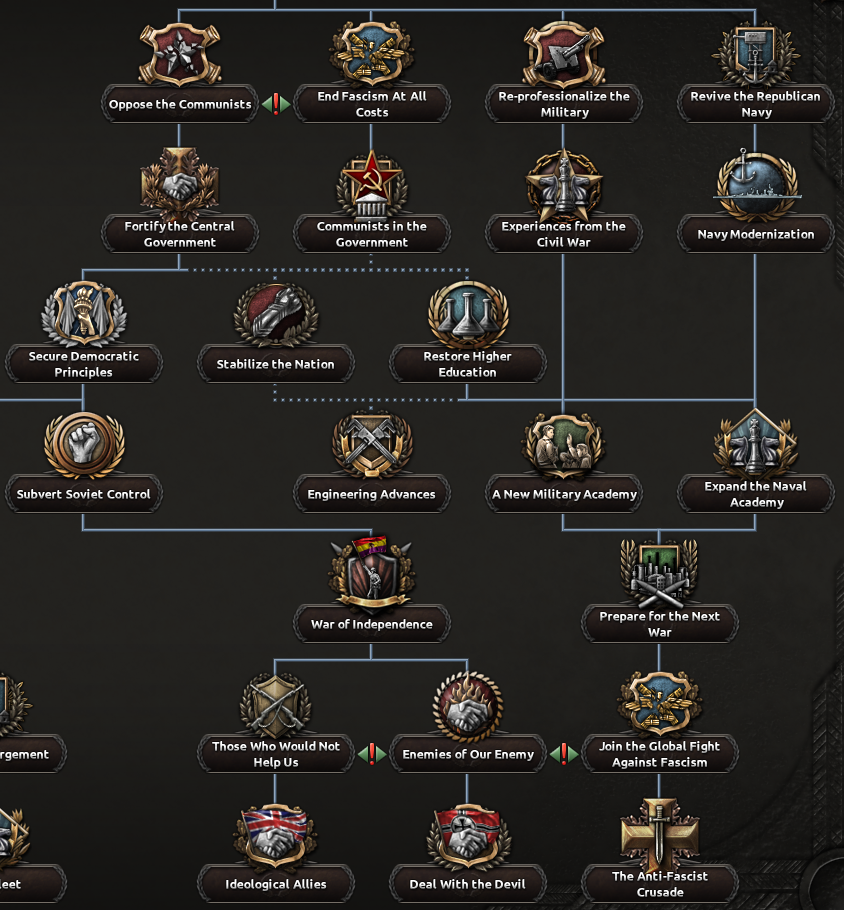
Stalinist (Communist) Branch
The Stalinist Communists were the Communist Party of Spain (PCE), and are referred to as such because of their loyalty to the Stalinist Communist doctrine. Their branch shares a start with that of the other Communist faction that we will deal with later, but splits up already within a handful of focuses. Historically, they shared the outlook of the Government, in that both it and the Stalinists were more concerned with defeating the Fascists and maintaining the cohesion of their coalition rather than pushing for a social revolution as the other groups did. In the Focus Tree this is represented by many points of contact between the two branches.
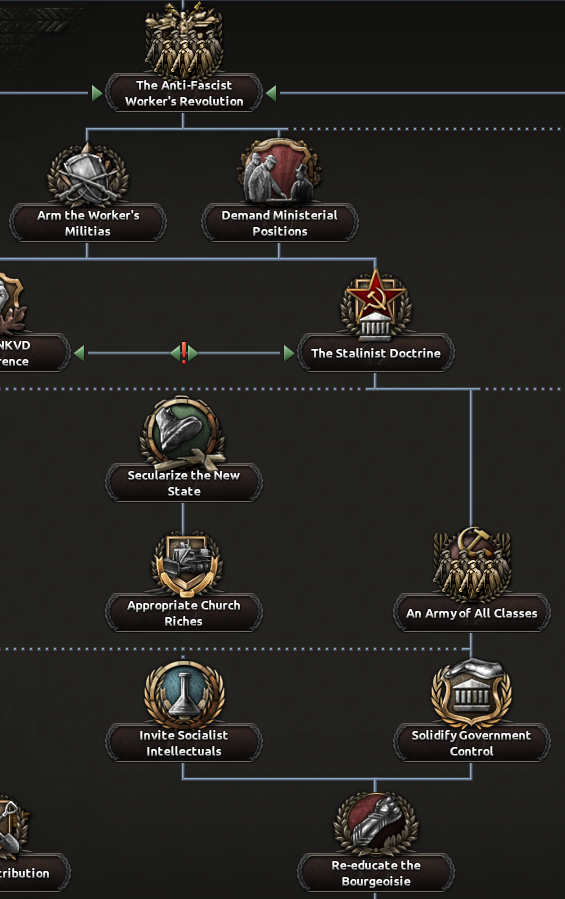
Main points of interest during the civil war for the Stalinists branch relate to Stalin’s Popular Front strategy. Rather than alienate other classes, these must be incorporated into the fight against Fascism first, and re-educated later, when the frontlines have stabilized. A notable exception to this is the clergy, as anti-clericalism is a core component of the Republic’s values. Church riches must instead be confiscated and used to finance the fight against the Nationalists, even if this will send the clergy into the arms of the Nationalists. Next, concessions must be obtained from the Republican government, at first with ministerial positions, but soon enough full control of the war effort must be demanded. And finally, just as with the Democratic branch, the recalcitrant independently-minded Anarchists and Communists must be eliminated for the good of the Republican cause as a whole.

For the Stalinists, Soviet Aid is much more of a no-brainer. Yes, you will get puppeted, but many of your strongest focuses tie in with this branch anyway, and there is always the Appeal for Increase Autonomy. Post-Civil War, the branch focuses heavily on fortifying the country, strengthening it as a bulwark from which to wage a two-front war with the Fascist nations lodged between Spain and the Soviet Union, should it come to that. Finally, focuses allow for the conquest of Portugal, the supporting of French Communists, and exacting vengeance on all nations who dared send Volunteers to the Nationalists during the Civil War.
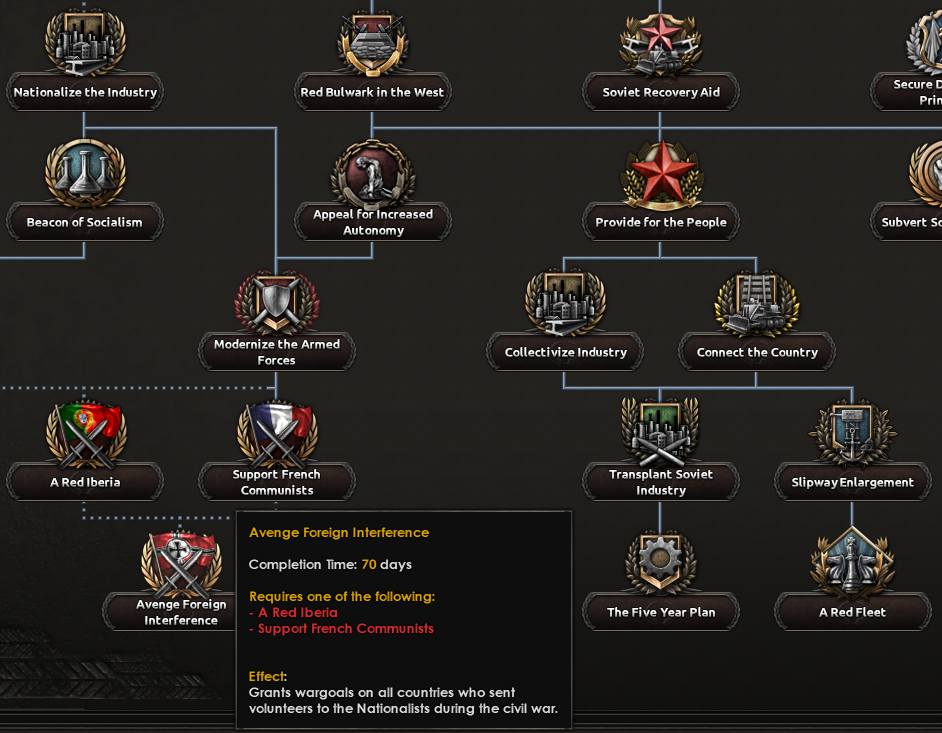
Independent Communist (Communist) Branch
The Independent Communists represent the POUM, a second Communist party in Spain that broke with both the Trotskyist and Stalinist Communist doctrines, opposing the latter heavily, and was a member of the “International Revolutionary Marxist Centre”, also called the “London Bureau” (nicknamed the 3½ International); a grouping of similar independently-minded Communist parties from various countries. Notably, in the Civil War George Orwell would fight with POUM militias, and the way the Stalinists undermined, manipulated, and repressed the party would greatly impact his thinking and later writings. Historically, this repression culminated in the May Days, a period of 5 days in May 1937 where actual street fighting occurred between the Stalinist Communists and the Government on the one hand, and the POUM and Anarchists on the other. After this, the Anarchists would be increasingly divided internally and its influence on the Civil War would wane, and the POUM would soon be outlawed altogether.
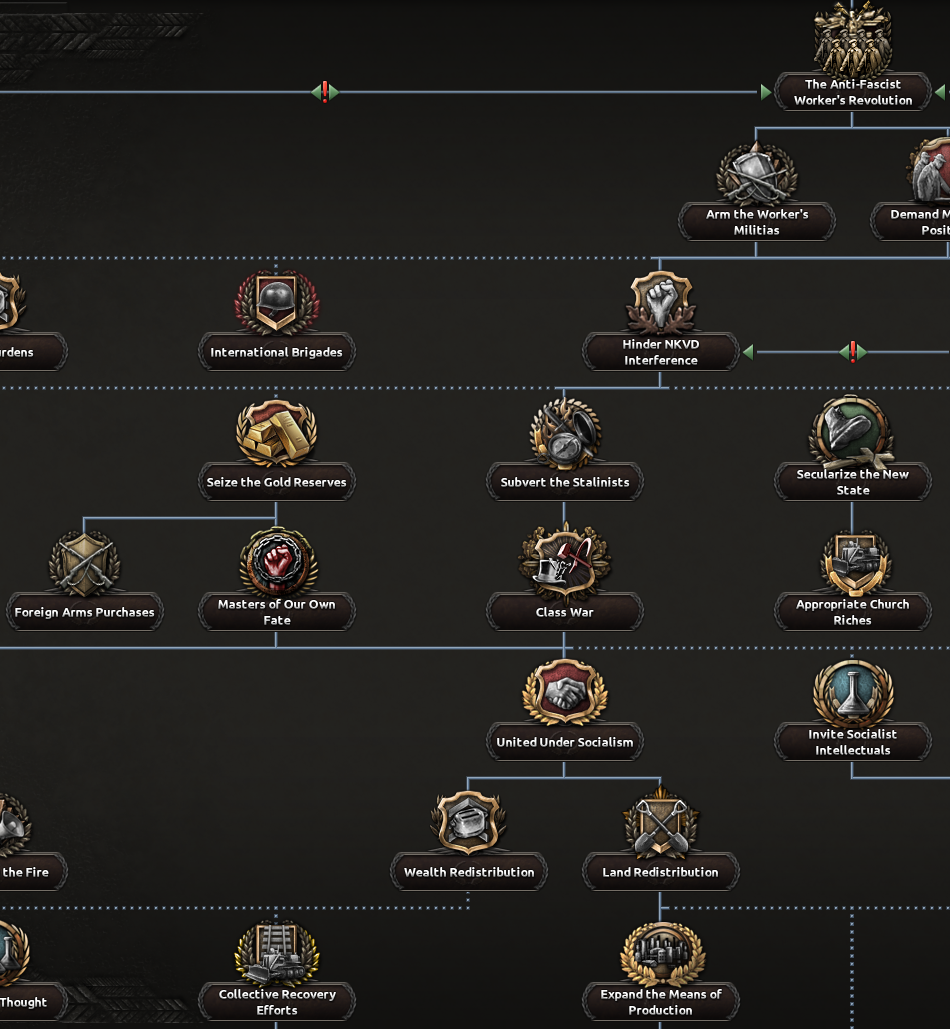
As the POUM, the major antagonist, other than the Nationalists, are the Stalinists. Early on steps must be taken to curtail Stalinist influence and interference, maintaining the party’s independence and putting a stop to the indiscriminate political assassinations perpetrated by the NKVD. International Brigades provides a steadily ticking manpower pool for the duration of the Civil War, aiding their cause somewhat. Unlike the Stalinists, the purpose of the POUM is social revolution, and so the Class War must be pursued. The fact that the Government opposes this and increasingly attempts to crack down on them means that eventually the step must be taken to Seize the Gold Reserves and use these to finance a full-blown uprising along with the Anarchists, to enable the Revolution to flourish.
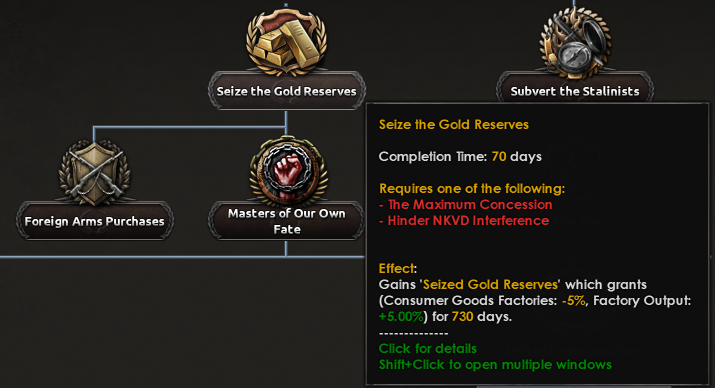
Post-Civil War parts of the tree focus on industrial and military improvements, as well as the formation of a People’s Fleet. Some industrial focuses are shared with the Anarchists, and some with the Stalinists. Unify the London Bureau will create a unique faction and invite all Communist nations that are not in a faction (or are Soviet Union or a Communist Mexico led by Trotsky). Further focuses generate wargoals against Fascist nations in Europe, nations led by Stalin or Trotsky, and finally the focuses to conquer Portugal and Avenge Foreign Interference are shared with the Stalinists.

Anarchist (Unaligned) Branch
The Anarchists are the final available branch for the Republican side. This branch represents the various autonomous communes that rose up in the area of Aragon and Catalonia during the civil war, and in which the fight against Fascism was most clearly accompanied by the Spanish Revolution. These communes organized themselves under a single Regional Defense Council of Aragon, and in the territory controlled by them collectivization of the workplace became a common theme. However, the independence with which they conducted themselves was a perpetual thorn in the eyes of the government and the Stalinists, and, as with the POUM, the May Days saw their influence severely curtailed. As Anarchist society is inherently incompatible with the way Nation-States are represented in HoI4, we’ve had to get creative with their representation. A key part of this ties in with the concept of the “Regional Defense Council”, as historically used by the Anarchists during the civil war.

The initial action points for the Anarchists involve the collectivization of all aspects of society - seizing the means of production, giving workers autonomy and self-management, seizing public transport, and increasing communal farming. Rather than recreate an army, like the other branches focus on, the Anarchist focus on arming the people themselves, preferring to rely on self-organized militias. Just like the Communists, they also gain access to the International Brigades Spirit. Eventually, though, the government will crack down on the Revolution, but, as with the Independent Communists, the player will be able to take a focus to launch the uprising from their side instead, gaining a temporary combat bonus.
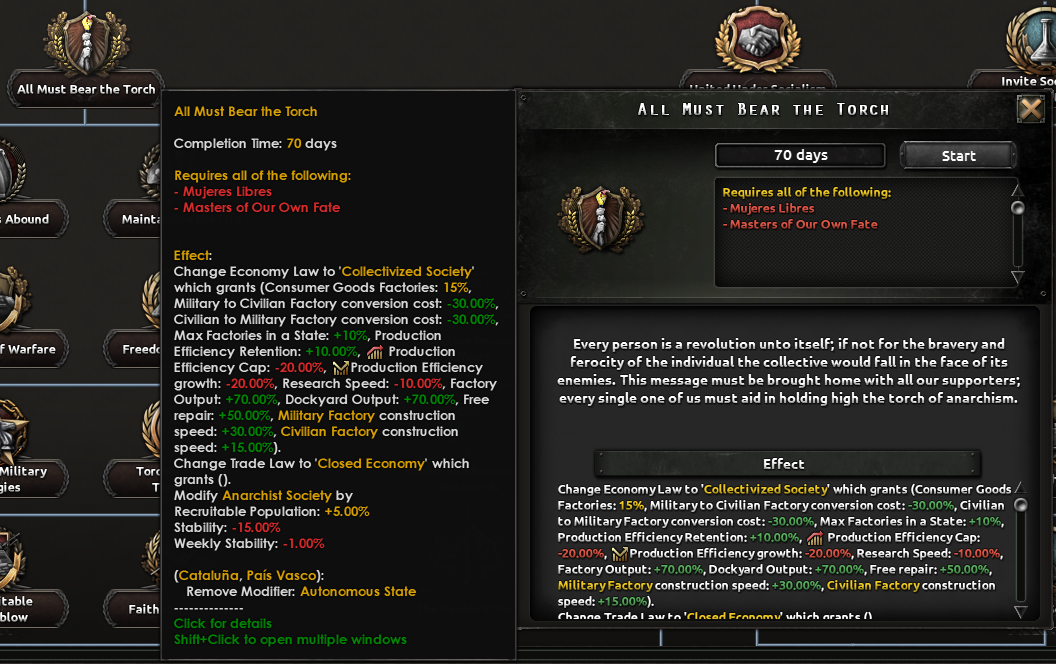
Once complete gender equality has been achieved through Mujeres Libres and the uprising has been started, either through government crack-down or through taking the focus Masters of Our Own Fate, the pivotal focus All Must Bear the Torch becomes available. This has a number of effects that impact the playstyle of the Anarchists:
This all comes at a cost, however: every single other nation on the face of the planet will hate you. Initially, during the civil war itself, this is only noticed by the fact that no nation will want to aid you, and will instead support hostile Spanish factions against you. However, once the civil war ends, this will result in major powers taking steps to actively quell the Anarchist Revolution - with nations receiving AI modifiers to act in a hostile manner towards the Regional Defense Council. As the Anarchists, you stand alone against the world.

The next part of the tree focuses on defending against this coming threat. Focuses will revolutionize military thinking, give combat bonuses to defense on core territory, and greatly increase War Support. A side branch will allow the Anarchist revolution to ‘spill over’ the Portuguese border, when the Anarchists share a border with them. The Portuguese Anarchism focus creates a civil war in Portugal, puppeting the Anarchist tag it creates, and annexing them once the Portuguese civil war has ended. Once this is complete, and the Spanish Civil War itself is also won, a new Regional Defense Council may be called into being: the Regional Defense Council of Iberia. This will core all Portuguese states, as well.
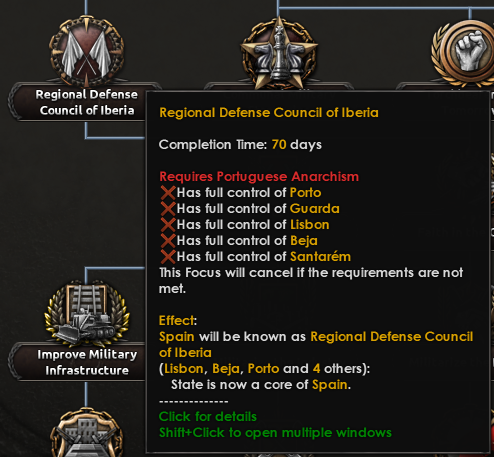
Finally, the finisher focuses focus greatly on preparing the Communes militarily for the Inevitable Counterblow. The success of the Revolution is a threat to the very way of life of the rest of the world, and they cannot let this stand. When they are done fighting among one another, they will come after you (and possibly even before…). But the Defense Council does not need to sit on its hands and wait for this to happen. Anarchism Knows No Borders provides a spirit that increases War Support even further, but also drastically increases justification time for War Goals. Plant the Seeds of Revolution allows for creating uprisings of Anarchists troops behind enemy lines, under your control. And finally, Global Defense Council will rename the country once again, illustrating its nature as an entity that has spread far beyond the confines of the Iberian peninsula. In addition, it allows for dynamically coring controlled hostile land in which Compliance has been raised to a sufficiently high level, as they simply reorganize into their own autonomous communes and join under the umbrella of the Defense Council.
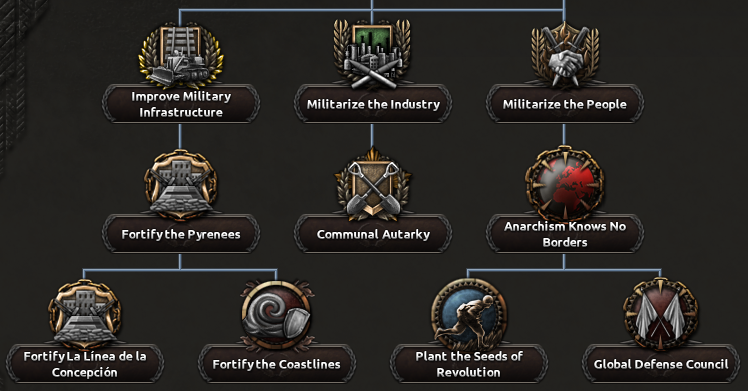
Playing as the Anarchists will pose significant challenges, as you are effectively expected to take on the entire world alone, with a (at least initially) limited economic powerbase. However, it also provides significant rewards for a player that manages to succeed and push their enemies back, dynamically growing their powerbase much more efficiently than other countries can.

Unfortunately, all Anarchist military commanders were on short-notice leave from the frontlines, and so were unavailable for screenshots…
Finally, we have a picture of both focus trees as they are presented to the player when they first load up the game as Spain, before they have taken any choices of who to support:

On today’s HoI4 stream I will be joining @Da9L to take a look at the new Spanish trees, and in particular the new Republican tree. This will be followed by a Q&A session, where we’ll take your questions about them The stream will be from 15:00-16:00 CET, and can be viewed here.
The stream will be from 15:00-16:00 CET, and can be viewed here.
We hope you’ll join us next week for another HoI4 dev diary!
Last week we talked a little bit about the design intent for Spain as a whole - so today we will move straight on to the interesting stuff
Obligatory Disclaimer:
This is still a work-in-progress, and much of the art, systems and balancing is/are not yet finished! You guys know the drill
Republican Spain Starting Situation

The starting position for Republican Spain is, naturally, the same as that for the Nationalists. They begin with the same 4 spirits, signifying the influence of Carlism, the Military’s disloyalty, and the political violence and strikes that are escalating in the initial half of 1936 (see our previous dev diary for more information on these).

The same initial choice is present at the start of the game, but instead of selecting A Great Spain, we will now go with The Popular Front.

The Popular Front was a loose alliance of political parties that were only really united in their opposition of Fascism. The idea of a Popular Front was formulated by Stalin in the mid-1930s, suggesting that the rapid growth of Fascism required a more unified response than Communism alone could provide. Effectively, it gave permission to subordinate Communist parties to band together with less extreme socialist parties, and even outright bourgeois parties, solely to combat Fascism in national politics. In Spain, the Popular Front that opposed the Fascist/Traditionalist CEDA (Spanish Confederation of Autonomous Rights - sometimes called the “Nationalist Front”) consisted of a variety of liberal, socialist, and communist parties, the most important of which (for the purposes of this diary) are the Communist Party of Spain (PCE), Workers’ Party of Marxist Unification (POUM), and the Republican Left (IR). This coalition was also supported by regional nationalists and the Anarchist Trade Unions CNT/FAI. This coalition paid off, and despite massive resources and an overwhelming election campaign by the CEDA, the Popular Front won the 1936 Spanish elections.
This victory was to be short-lived, however. Unbeknownst to the Republicans, in the aftermath of the failed elections the CEDA would hand over their sizeable campaign chest to the plotting military leaders to finance a rebellion, and political violence from both sides would escalate in the coming months. As with the Nationalist side, this is represented by various decisions and missions. The sole distinction is the change in perspective. As all state garrisons are initially fully controlled by the Republican side anyway (they all begin with a Nationalist control of None), the garrison control decisions are unavailable until the Nationalist side has begun contesting Republican control in any location. From that point on, it becomes possible to attempt to flip them back.

A second point that sets the Republicans apart from their Nationalist adversaries are the nature of their focuses. The full pre-Civil War path for the Nationalists has a total duration of 210 days to complete, which means that, as long as a player continuously takes focuses, they are guaranteed to finish the whole path before the civil can start, even at the soonest start date. Not so for the Republicans. Republican pre-Civil War focuses (after the initial choice) last twice as long as their adversaries’, resulting in a total duration of 385 days to fully complete this path (therefore requiring the civil war to be delayed until after January 20, 1937). This should immediately make it obvious why it is advantageous for the Nationalists to begin the civil war as soon as possible - this will ensure the Republicans will only have time to complete their first two focuses. And as the impact of the Republican focuses progressively increases, this vastly weakens the initial position for the Republicans, relative to the Nationalists.

- Securing the Guardia de Asalto or Guardia Civil gives either a few trained units, or double the number of untrained units (respectively) at the start of the civil war. Whichever the player chooses, the Nationalists get the opposite reward.
- Train the Union Youth gives 5 trained units at the start of the civil war, as well as other bonuses.
- Enlarging the Weapon Caches refers to the weapon caches that were secreted away ever since the Asturias Miners’ Revolt, and lie ready for use to this day. It is the first focus that will not be available to the Republicans if the Nationalists manage to achieve their goal of starting the civil war near its historical start date. While normally the equipment is split 50-50 between the two sides at the start of the civil war, this focus sways this to (currently) 80-20 in favor of the Republicans.
- Distribute Arms to the People refers to various calls from prominent politicians and groups for the government to start issuing weapons to regular citizens, as it began to become obvious that the Military could not be trusted. This focus gives 10 untrained divisions at the start of the civil war, as well as other bonuses.
- Disband the Army is the finishing focus in the Republicans’ preparations for the civil war. It is the ‘nuclear option’, where the government outright disbands the entire army and attempts to purge it of disloyal elements. However, though it will hand the initiative to the government, the various plotting leaders will not go easily and, likely will elect to rise up rather than be imprisoned. Accordingly, this focus will immediately start the civil war when completed. While the civil war normally has a flat 50-50 distribution of the nation’s pre-Civil War armed forces between the two sides, this focus increases this to (currently) an 80-20 split in favor of the Republicans. It also provides a large chunk of Political Power. However, with the loyalty of the military so severely tainted, the government will immediately disband their portion of this pre-Civil War military. This is something that occurs regardless of whether you take the focus or not (if the focus is not taken, this step is taken in the Civil War start event - regardless of when it starts), and so the focus mainly serves to greatly weaken the Nationalist side’s starting position.

As the Civil War starts, the Republican side begins with all states that do not have Total Nationalist garrison control. However, states where the Nationalists have more control than the Republicans will spawn more Nationalist troops, making it likely that these will be lost soon afterwards. In addition, the Carlism Spirit is no longer relevant for the Republicans from this point on, and is removed, while a new Spirit Disbanded Army is added (again, regardless of whether Disband the Army as a focus is taken or not), representing the (quite frankly) disastrous impact the disbanding of the army historically had on the first months of the Republican war effort. Various focuses in the different branches diminish and remove this Spirit. Beyond this, the same Offensives decisions are available to the Republicans, as are available to the Nationalists (see more information about this again in our previous dev diary).
The Republican faction begins the civil war as Democratic, but as a whole it is even more internally divided than the Nationalists. Not three, but four different Republican factions vie for control of post-Civil War Spain, and this fight for supremacy will likely result into internal fracturing and outright violence even during the Civil War.
Republican (Democratic) Branch
The Second Republic at the start of the Civil War struggled to defend itself against the rebellion, while also maintaining cohesion and singularity of purpose within the faction itself. On the one hand, the communist and anarchist militias that supported the Popular Front played a key role in preventing the outright success of the initial coup attempt in the first place, and they were invaluable to the Republican war effort in the opening months of the Civil War, when the government was in the process of recreating a new army after disbanding the old. On the other hand, these groups also had wildly differing viewpoints on how the post-Civil War society should be structured, and idealism and fanaticism on all sides could easily bloom into violence. Historically, major influence came from the Soviet Union, which provided the Republic with much-needed weapons and equipment, but also meddled extensively in internal affairs, attempting to root out any Communists who might be critical of Stalin’s leadership. Ultimately, this would serve to completely undermine the war effort, resulting in the virtual elimination of two of the Front’s four (broadly-speaking) distinct groups as active participants in the Civil War, not by Nationalist doing, but by their own hands.

One of the major issues facing the Democratic government of the Second Republic involves the recreation of a proper army, reducing reliance on idealistic and undisciplined militias that is represented in the Disbanded Army Spirit. Others deal with stemming the flow of the Nationalist advance, fortifying the various cities and towns in their path, and especially fortifying the Republican foothold in the Basque Country (if this is controlled at the Civil War’s start). But above all, the single biggest threat facing the government in the short term is the inevitable uprising of the Anarchist and Independent Communist militias (always represented as Anarchists if this uprising occurs from the Democratic/Stalinist perspective), as Stalinist meddling and manipulations will eventually break down all remnants of trust within these groups and the government. This uprising may be delayed through the Anti-Fascist Unity focus and the decisions it unlocks, but these can only delay it somewhat, and never prevent it. They are only intended as a desperate measure if you really cannot afford the uprising right then. Just as with the Falangist and Carlists paths we discussed last week, a focus Crush the Revolution exists that will immediately trigger the civil-war-within-the-civil-war and provide a temporary combat bonus against them.

Together with Relocate the Gold Reserves, crushing the Anarchists and Independent Communists is a requirement for opening up the possibility of much larger Soviet aid than initially offered. This aid consists of various combat modifiers, tech bonuses, increased Volunteer caps for the Soviet Union, construction bonuses, and even tech sharing. It also opens up for a powerful Soviet Aid post-Civil War recovery branch. While powerful, as all this aid comes at a price, however… Stalinist control over the government will increase, and while moving the Gold Reserves abroad may keep them out of the hands of the Nationalists, it will not keep them safe from foreign seizure… Going down this path will result in the Second Republic being puppeted by the Soviet Union upon the conclusion of the civil war, and they will be unlikely to release their control over the country willingly…

Regardless of whether the player decides to pursue this aid, they will need to manage the influence of the Stalinists on their own government. It is possible to maintain true to the Democratic principles on which the Second Republic was based, but this will come at the cost of combat penalties that may well prove to be problematic during the Civil War - the Communists were an integral part of the anti-Fascist fight, after all. However, staying true to your Democratic foundations will allow you to eventually subvert Soviet control even if you pursued Soviet aid previously and were puppeted as a result. This finally opens up into a branch where, now that the Fascists have been defeated, Spain may fight a final War of Independence against the Communists and the Soviet Union, to finally earn their deserved freedom. In this, they may either seek membership of the Allies, or strike a pragmatic Deal with the Devil and request military aid from those who have experience in fighting the Soviets - the very same people who opposed them during the Civil War: Germany and Italy.

It is also possible to give in to the Stalinist pressure, and focus on defeating Fascism, even at the cost of Democratic principles. If this option is selected, the government will switch to Communist, and a future War of Independence becomes unavailable. Instead, it will become possible to Appeal for Increased Autonomy (on the Stalinist side), becoming a full-fledged member of the Comintern rather than a puppet. Finally, remaining focuses for the Democratic branch focus on rebuilding their army and navy, and preparing for a global Anti-Fascist Crusade.

Stalinist (Communist) Branch
The Stalinist Communists were the Communist Party of Spain (PCE), and are referred to as such because of their loyalty to the Stalinist Communist doctrine. Their branch shares a start with that of the other Communist faction that we will deal with later, but splits up already within a handful of focuses. Historically, they shared the outlook of the Government, in that both it and the Stalinists were more concerned with defeating the Fascists and maintaining the cohesion of their coalition rather than pushing for a social revolution as the other groups did. In the Focus Tree this is represented by many points of contact between the two branches.

Main points of interest during the civil war for the Stalinists branch relate to Stalin’s Popular Front strategy. Rather than alienate other classes, these must be incorporated into the fight against Fascism first, and re-educated later, when the frontlines have stabilized. A notable exception to this is the clergy, as anti-clericalism is a core component of the Republic’s values. Church riches must instead be confiscated and used to finance the fight against the Nationalists, even if this will send the clergy into the arms of the Nationalists. Next, concessions must be obtained from the Republican government, at first with ministerial positions, but soon enough full control of the war effort must be demanded. And finally, just as with the Democratic branch, the recalcitrant independently-minded Anarchists and Communists must be eliminated for the good of the Republican cause as a whole.

For the Stalinists, Soviet Aid is much more of a no-brainer. Yes, you will get puppeted, but many of your strongest focuses tie in with this branch anyway, and there is always the Appeal for Increase Autonomy. Post-Civil War, the branch focuses heavily on fortifying the country, strengthening it as a bulwark from which to wage a two-front war with the Fascist nations lodged between Spain and the Soviet Union, should it come to that. Finally, focuses allow for the conquest of Portugal, the supporting of French Communists, and exacting vengeance on all nations who dared send Volunteers to the Nationalists during the Civil War.

Independent Communist (Communist) Branch
The Independent Communists represent the POUM, a second Communist party in Spain that broke with both the Trotskyist and Stalinist Communist doctrines, opposing the latter heavily, and was a member of the “International Revolutionary Marxist Centre”, also called the “London Bureau” (nicknamed the 3½ International); a grouping of similar independently-minded Communist parties from various countries. Notably, in the Civil War George Orwell would fight with POUM militias, and the way the Stalinists undermined, manipulated, and repressed the party would greatly impact his thinking and later writings. Historically, this repression culminated in the May Days, a period of 5 days in May 1937 where actual street fighting occurred between the Stalinist Communists and the Government on the one hand, and the POUM and Anarchists on the other. After this, the Anarchists would be increasingly divided internally and its influence on the Civil War would wane, and the POUM would soon be outlawed altogether.

As the POUM, the major antagonist, other than the Nationalists, are the Stalinists. Early on steps must be taken to curtail Stalinist influence and interference, maintaining the party’s independence and putting a stop to the indiscriminate political assassinations perpetrated by the NKVD. International Brigades provides a steadily ticking manpower pool for the duration of the Civil War, aiding their cause somewhat. Unlike the Stalinists, the purpose of the POUM is social revolution, and so the Class War must be pursued. The fact that the Government opposes this and increasingly attempts to crack down on them means that eventually the step must be taken to Seize the Gold Reserves and use these to finance a full-blown uprising along with the Anarchists, to enable the Revolution to flourish.

Post-Civil War parts of the tree focus on industrial and military improvements, as well as the formation of a People’s Fleet. Some industrial focuses are shared with the Anarchists, and some with the Stalinists. Unify the London Bureau will create a unique faction and invite all Communist nations that are not in a faction (or are Soviet Union or a Communist Mexico led by Trotsky). Further focuses generate wargoals against Fascist nations in Europe, nations led by Stalin or Trotsky, and finally the focuses to conquer Portugal and Avenge Foreign Interference are shared with the Stalinists.

Anarchist (Unaligned) Branch
The Anarchists are the final available branch for the Republican side. This branch represents the various autonomous communes that rose up in the area of Aragon and Catalonia during the civil war, and in which the fight against Fascism was most clearly accompanied by the Spanish Revolution. These communes organized themselves under a single Regional Defense Council of Aragon, and in the territory controlled by them collectivization of the workplace became a common theme. However, the independence with which they conducted themselves was a perpetual thorn in the eyes of the government and the Stalinists, and, as with the POUM, the May Days saw their influence severely curtailed. As Anarchist society is inherently incompatible with the way Nation-States are represented in HoI4, we’ve had to get creative with their representation. A key part of this ties in with the concept of the “Regional Defense Council”, as historically used by the Anarchists during the civil war.

The initial action points for the Anarchists involve the collectivization of all aspects of society - seizing the means of production, giving workers autonomy and self-management, seizing public transport, and increasing communal farming. Rather than recreate an army, like the other branches focus on, the Anarchist focus on arming the people themselves, preferring to rely on self-organized militias. Just like the Communists, they also gain access to the International Brigades Spirit. Eventually, though, the government will crack down on the Revolution, but, as with the Independent Communists, the player will be able to take a focus to launch the uprising from their side instead, gaining a temporary combat bonus.

Once complete gender equality has been achieved through Mujeres Libres and the uprising has been started, either through government crack-down or through taking the focus Masters of Our Own Fate, the pivotal focus All Must Bear the Torch becomes available. This has a number of effects that impact the playstyle of the Anarchists:
- The economic law is changed to a unique law Collectivized Society, which is slightly superior to War Economy, but also has (at first glance) significant bonuses to factory and dockyard output. It will not be possible to change away from this.
- Trade law is changed to Closed Economy, and it will not be possible to change away from this.
- The Anarchist Society Spirit that is first applied in the Regional Defense Council of Aragon focus, and which is continuously improved upon throughout the branch, gains a whopping (currently) 5% recruitable population. However, it also now gives a base -15% stability and -1% weekly stability.
- Autonomous State modifiers are removed from all states that have this.
This all comes at a cost, however: every single other nation on the face of the planet will hate you. Initially, during the civil war itself, this is only noticed by the fact that no nation will want to aid you, and will instead support hostile Spanish factions against you. However, once the civil war ends, this will result in major powers taking steps to actively quell the Anarchist Revolution - with nations receiving AI modifiers to act in a hostile manner towards the Regional Defense Council. As the Anarchists, you stand alone against the world.

The next part of the tree focuses on defending against this coming threat. Focuses will revolutionize military thinking, give combat bonuses to defense on core territory, and greatly increase War Support. A side branch will allow the Anarchist revolution to ‘spill over’ the Portuguese border, when the Anarchists share a border with them. The Portuguese Anarchism focus creates a civil war in Portugal, puppeting the Anarchist tag it creates, and annexing them once the Portuguese civil war has ended. Once this is complete, and the Spanish Civil War itself is also won, a new Regional Defense Council may be called into being: the Regional Defense Council of Iberia. This will core all Portuguese states, as well.

Finally, the finisher focuses focus greatly on preparing the Communes militarily for the Inevitable Counterblow. The success of the Revolution is a threat to the very way of life of the rest of the world, and they cannot let this stand. When they are done fighting among one another, they will come after you (and possibly even before…). But the Defense Council does not need to sit on its hands and wait for this to happen. Anarchism Knows No Borders provides a spirit that increases War Support even further, but also drastically increases justification time for War Goals. Plant the Seeds of Revolution allows for creating uprisings of Anarchists troops behind enemy lines, under your control. And finally, Global Defense Council will rename the country once again, illustrating its nature as an entity that has spread far beyond the confines of the Iberian peninsula. In addition, it allows for dynamically coring controlled hostile land in which Compliance has been raised to a sufficiently high level, as they simply reorganize into their own autonomous communes and join under the umbrella of the Defense Council.

Playing as the Anarchists will pose significant challenges, as you are effectively expected to take on the entire world alone, with a (at least initially) limited economic powerbase. However, it also provides significant rewards for a player that manages to succeed and push their enemies back, dynamically growing their powerbase much more efficiently than other countries can.

Unfortunately, all Anarchist military commanders were on short-notice leave from the frontlines, and so were unavailable for screenshots…
Finally, we have a picture of both focus trees as they are presented to the player when they first load up the game as Spain, before they have taken any choices of who to support:
On today’s HoI4 stream I will be joining @Da9L to take a look at the new Spanish trees, and in particular the new Republican tree. This will be followed by a Q&A session, where we’ll take your questions about them
We hope you’ll join us next week for another HoI4 dev diary!
Rejected Titles
Anarchy is the least stable form of society - it will collapse and form a government at the slightest touch
Splitting the party to save the party
The Anarchist police state rides again
How I stopped worrying about stability and started loving the collective
Spain was the most Popular Front ever
Sanity is a bourgeois concept
Please Comrade Stalin may I have some more foreign aid?
Casablanca Blues
In Australia, we drop the ‘FAI’
Homage to Cataluña
The Communist Party of Spain? We're the Workers’ Party of Marxist Unification! Splitters!
"Gentleman, we do not stop until Madrid." "But what about the Republic?" "You've already had it." "We've had one, yes, but what about a Second Republic?"
Basque-ing in Spain’s greatness!
My allegiance is to the Republic; to Democracy!
“We don't have a Caudillo! I told you, we're an anarcho-syndicalist commune. We take it in turns to act as a sort of executive officer for the week [...].”
PCE be upon you, Spain. - love, Stalin <3
Red makes it go faster!
Anarchy is the least stable form of society - it will collapse and form a government at the slightest touch
Splitting the party to save the party
The Anarchist police state rides again
How I stopped worrying about stability and started loving the collective
Spain was the most Popular Front ever
Sanity is a bourgeois concept
Please Comrade Stalin may I have some more foreign aid?
Casablanca Blues
In Australia, we drop the ‘FAI’
Homage to Cataluña
The Communist Party of Spain? We're the Workers’ Party of Marxist Unification! Splitters!
"Gentleman, we do not stop until Madrid." "But what about the Republic?" "You've already had it." "We've had one, yes, but what about a Second Republic?"
Basque-ing in Spain’s greatness!
My allegiance is to the Republic; to Democracy!
“We don't have a Caudillo! I told you, we're an anarcho-syndicalist commune. We take it in turns to act as a sort of executive officer for the week [...].”
PCE be upon you, Spain. - love, Stalin <3
Red makes it go faster!

